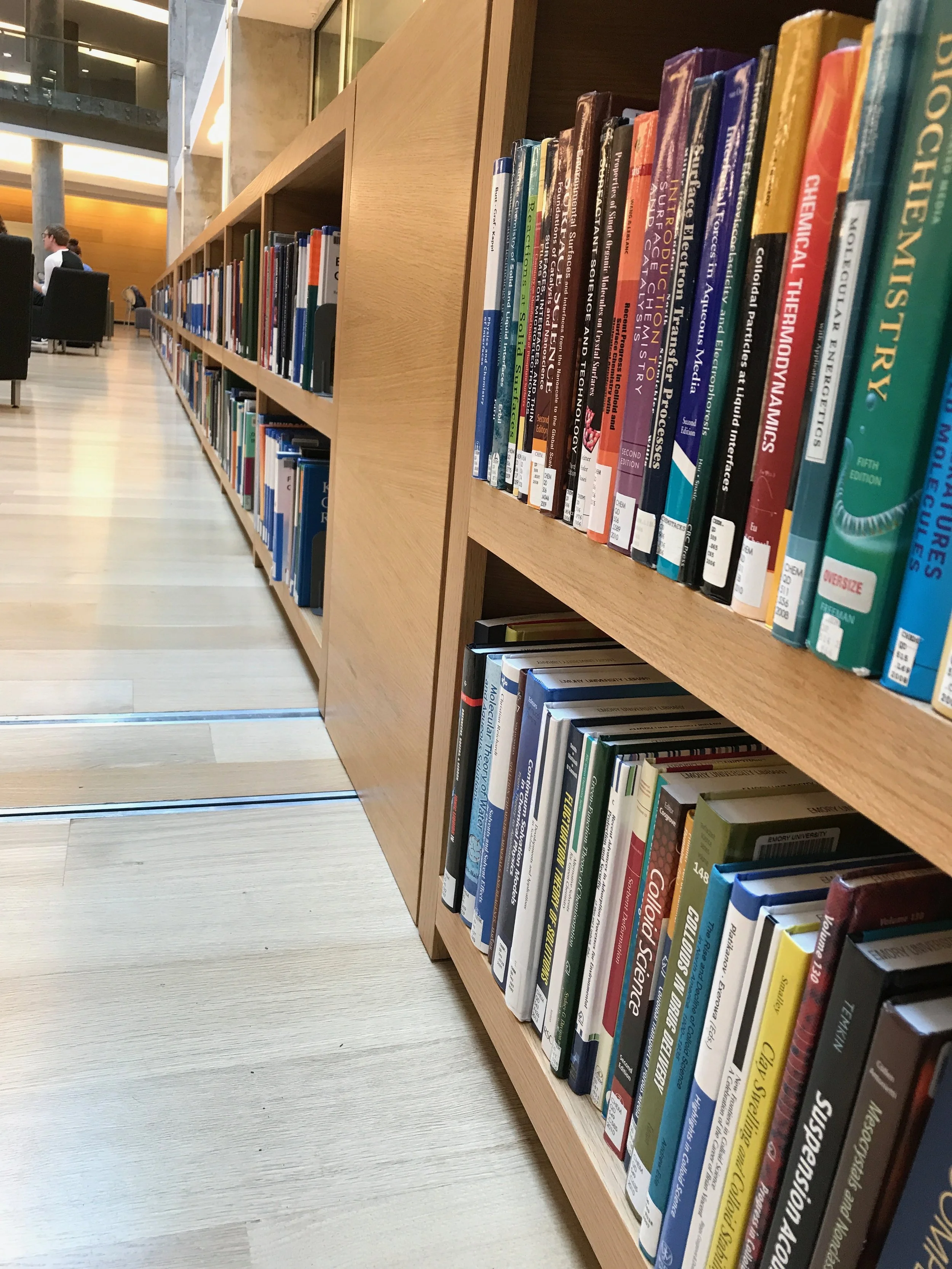By: Megan R. Hockman
Browsing through social media, it seems that there is an ever-growing body of literature detailing the impact of graduate school on the mental health of graduate students. Hearteningly, these articles are being shared by students who seem to be seeking to end the stigma against mental health conversations and to raise awareness about the problem in the hopes of solving it. It’s no great mystery that, as graduate students, we face an extraordinary amount of pressure, making no small number of sacrifices in the pursuit of our degrees. But what are we doing to cope with these problems? What constitutes a healthy balance in a world where productivity is the name of the game? How can we be advocates for ourselves and our peers while avoiding the guilt that we sometimes feel for doing so?
A paper published in Academic Psychiatry by Emory researchers in 2014 explored the mental health of graduate students specifically. Their findings were consistent with other published literature of the time, indicating that more than half of graduate students at Emory who responded to the survey reported feeling negative emotions, such as worrying a lot or feeling life is too stressful. Of the those surveyed, students that were older in age were more likely to utilize counseling/therapy services1. It is possible that this discrepancy exists because younger students aren’t aware of the available resources or feel uncomfortable using them. Informing incoming graduate students about the importance of maintaining good mental health and possible ways to do so is critical, perhaps with a particular emphasis on those who are entering earlier in life. Although these results are compelling, it is possible that the data could be skewed towards students who were experiencing mental health problems and therefore more likely to answer survey questions pertaining to them. However, another more recent study of European PhD students indicated that they are more affected by mental health problems than the non-graduate student population2. Both studies indicated that mental health problems were more prevalent in the female populations surveyed. There are a multitude of other sources that have surveyed different groups of students for a number of parameters, but the consensus is that mental health symptoms such as depression and anxiety are prevalent in the graduate student population. This is a problem, and how we address this problem is important.
A few months ago, I called my dad to talk about some of the stresses I was going through, including a slew of experiments that yielded less-than-optimal results. These data dry spells are supposedly common, but the conversations around academic failure seem relatively sparse (which probably contributes to feelings of anxiety that many of us have). His response to my problems? I must not be working hard enough. He was not trying to sound critical or harsh. His reaction was a result of one traditional method of dealing with stress and failure- if you can’t work through a problem you must not be putting in enough effort. This mentality seems to be reflected in the long hours that graduate students clock despite the toll it can take on mental health. Since starting as a graduate student three years ago, I have come to realize that while this solution may seem reasonable at first glance- I’ll get results quicker, and the more results I get the more likely I’ll be able to elicit a positive outcome- it neglects to consider the importance of balance. This means putting time towards both work and play- time working on our research but also out doing things that we enjoy that don’t contribute directly to a degree. This balance just might be the key to maintaining good mental health while remaining productive as a graduate student.
What constitutes a good balance is highly individual. Each person has their own way of defining success, productivity, and relaxation. While this isn’t a novel concept, it seems to be forgotten during academic pursuits where we are continually in contact with peers who may seem to be more successful. We end up comparing ourselves to them, maybe even attempting to mimic the processes they use that make them appear so productive. This can occasionally lead to epiphanies about what works best for us but can also lead to burnout. Exploration of what works for the individual, and acknowledgement that it’s okay to embrace these differences, is integral to the development of practices that keep us happy and productive.
A year ago, I was in the midst of studying for my qualifying exam. This is a notoriously stressful point in any graduate student’s career and the pressure is enormous. It was then that I realized the importance of balancing my research and my personal life. I noticed that my rest days from studying left me feeling inspired and helped identify things I missed during heavy study periods. To release my anxious energy, I started running. There was no goal to this running, except to get outside (which I knew was a healthy space for me) and give myself the room to sort through my stress in a healthy way. It was an activity on which I wouldn’t be graded or judged (except against myself) and I could thoroughly enjoy without external pressure. There are any numbers of activities that fit these criteria, but running is what worked for me. I realized that I was sleeping better, feeling better, and I could think about my studies during a long run and not feel so anxious about the impending exam. Knowing I would have time to myself to go run made me better able to devote time to studying because it wasn’t a daunting, never-ending task. A run was a reward for studying and inspired me to go do more. A year later, I am still going out and running five days a week. I could write a whole series of articles on the ways ultra-distance running is comparable to the PhD experience, and has helped me tackle some of the bigger problems I’ve encountered, but the message here is that I’m a better student and researcher because of my running and the balance it’s helped create between work life and “real life”.
I’ve had conversations with a lot of peers, and it seems that there is no consensus about the “best way” to handle stress. Some students create strict boundaries around their work- when they’re not pursuing their studies, their minds are somewhere else entirely. Creating these boundaries can allow the mind to have time to refresh, as long as they are upheld. Going out on the weekend with friends outside of one’s discipline can be a great way to do this- it encourages conversation about things outside research and academic pursuits. If your only friends are ones from your program, it could be helpful to put a strict “embargo” on work talk for the evening. For other students, this method may cause guilt for not being present at work, which can lead to anxiety and a lack of the mental rejuvenation it’s meant to create. If that’s the case, perhaps a more active form of self-care is called for. Removing oneself from the stressful environment to someplace new, but allowing thoughts about work to flow unrestricted, could alleviate the anxiety caused by the work and the anxiety caused by not doing work. This is what I do when I run. Some of my friends like to go to the bar with other graduate students and talk about their problems over a drink. The commonality between most students is the importance of taking a break. How long that break is, and what it consists of, is up to the individual.
To accompany this exploration, it’s important to keep our mentors in the loop and have conversations about the expectations they have for us and those we set for ourselves. This can ease the transition from “normal” practices that end up causing distress to a more balanced lifestyle. Such conversations aren’t always easy, but there are on-campus resources to help with this. The Atlanta BEST program held a workshop series entitled “Maximizing Mentorship: Building Your Mentee Toolbox," which was aimed at helping graduate students build better relationships with their mentors and communicate more effectively. They also included a book entitled “Crucial Conversations: Tools for Talking When Stakes Are High, Second Edition” which is a great resource for students who may want to improve communication with mentors. Additionally, faculty at Emory University founded the Atlanta Society of Mentors (ASOM) with the goal of improving the mentoring culture through recognizing and being inclusive of diverse perspectives, talent, and career interests. It is not an easy subject to bring up, but it’s an important one. With the ever-growing body of literature surrounding the mental health impacts of graduate school, the community is becoming increasingly aware of the problem. Our mentors want what is best for us, so telling them when our needs are not being met in some way could open the door to a more productive working relationship and improved mental health. If you have concerns about talking to your advisor directly, it can help to reach out to other members of the community such as committee members or other faculty members. Communication is key when it comes to ending the current stigma and finding solutions that work for all involved parties.
As an Emory student, there are a number of excellent resources available. I myself have sought counseling at the Counseling and Psychological Services center (CAPS) and participated in the stress clinic. CAPS services provide a preliminary “placement” session in which you speak to a member of the team to assess your specific needs. You are then paired with a counselor who suits those needs for a total of 7 sessions per academic year. Should 7 sessions not be enough, the center has a list of local therapists readily available. The stress clinic utilizes biofeedback software and a number of classical stress reduction techniques, such as controlled breathing techniques, to help students determine better ways of managing stress. The biofeedback equipment provides physiological data about which techniques are helping the most, which is pretty interesting to see. For students interested in group therapy, there are a number of support and process groups available through the CAPS website. For late night moments of overwhelm and loneliness, the Emory HelpLine provides confidential peer support that you can call between 8:30 p.m. and 1:00 a.m. All of these services are great for coping with the stresses of graduate school, and we shouldn’t be concerned about using them.
Graduate school is hard. There are hundreds of reasons why we feel the stresses and anxieties that we do. Some of these are reasonable, while others are a result of a system that will, unfortunately, take some time to change. As a population we can work hard to effect positive change by being more open about the problems we see and working with one another to fix them. On an individual level, we owe it to ourselves to realize the importance of self-care and individuality. In a system where we are all judged by a set of standards, it is still possible to reach these standards in our own unique ways. Exploring what works, communicating openly about our needs, and utilizing the resources available to us are all ways we can start to take better care of ourselves and ultimately find happiness and success.
1. Garcia-Williams, A. G.; Moffitt, L.; Kaslow, N. J., Mental health and suicidal behavior among graduate students. Acad Psychiatry 2014, 38 (5), 554-60.
2. Levecque, K.; Anseel, F.; De Beuckelaer, A.; Van der Heyden, J.; Gisle, L., Work organization and mental health problems in PhD students. Research Policy 2017, 46 (4), 868-879.









